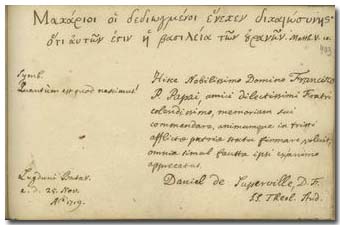

Hisce Nobilissimo Domino Francisco P. Papai,
amici dilectissimi Fratri colendissimo, memoriam sui commendare,
animumque in tristi afflictae patriae statu firmare voluit, omnia
simul fausta ipsi ex animo apprecatur
Daniel de Superville, D[anieli] F[ilius] S.
S. Theol. Stud. Symb. Quantùm est
quod nescimus! * Lugduni Batav[orum]
a. d. 25. Nov. A. 1719.
|
* Mt 5:10: Vulgate: “beati qui
persecutionem patiuntur propter iustitiam quoniam ipsorum est
regnum caelorum”. * This same motto is
used by Bernhard
Albinus on p. 105. Cf. also the poem
written on the same motto by
Andreas Gryphius.
|
|
|
Blessed are they which are persecuted for righteousness'
sake: for theirs is the kingdom of heaven. Mt 5:10. *
With this I want to recommend myself into the
memory of the noble Mr. Ferenc Pápai Páriz, the honourable brother
of my dear friend, to confirm his soul amidst the
present tribulations of his fatherland, and to wish him all the
best from all my heart
Daniel de Superville, son of Daniel, student of
theology
Motto: How many things are there that we do not
know! *
In Leiden, on November 25, 1719.
|
p. 403. Leiden, November 25, 1719
Superville, Daniel de, jun.
(1700-1762), Reformed pastor in the
Netherlands
Daniel de Superville, Jun. was born in Rotterdam
on July 11, 1700, the son of the French Reformed theologian Daniel de S.
(1657-1728) and of Catharina van Armeyde
(1663-1719). He immatriculated in Leiden in the autumn of 1717. He
passed his exam as a proponent in 1723, became an assistant pastor on
the side of his father in Rotterdam, and in 1725, when this latter
retired, he followed him in his office. He was popular amongst his
community, and was regarded an eminent preacher. In 1731 he was
invited to Amsterdam, but he refused to go. Because of his
inclination to illness, and on the counsel of Boerhaave he spent
two years at the baths of Spa. He died in Rotterdam, on May 24,
1762. He founded no family. He translated the English history
by Burnet and The improvement of the mind of Isaac Watts (La
culture de l'esprit, Amsterdam 1762), and for a while he
edited, together with Justus van Effen, Willem Jacob ’s Gravesande, Élias
de Joncourt and others, the Journal litéraire de la
Haye (1713-1737). His sermons were published:
Sermons sur divers textes de l’Ecriture Sainte, par Daniel de
Superville, le Fils. Amsterdam, 1754.
Daniel de Superville, Jun. was a student of theology in Leiden
when he wrote his memento in the album of Ferenc Pápai Páriz, Jun.
His father, the pastor of Rotterdam wrote his verses in the album
eleven days later (p. 365).
•
NNBW V 841 |

